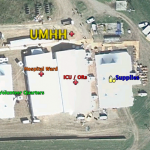“MacGyver Pharmacy” in Haiti
Ewa M. Dzwierzynski ‘96
 Shortly after the devastating earthquake in Haiti, I enthusiastically answered an urgent call for volunteer pharmacists through the American College of Clinical Pharmacists. Being a consummate volunteer, I was thrilled to use my professional skills to help with the earthquake relief effort in Port-au-Prince, Haiti.
Shortly after the devastating earthquake in Haiti, I enthusiastically answered an urgent call for volunteer pharmacists through the American College of Clinical Pharmacists. Being a consummate volunteer, I was thrilled to use my professional skills to help with the earthquake relief effort in Port-au-Prince, Haiti.
After a month passed, I received an email from the University of Miami stating there was an immediate need for pharmacists. I signed up, and in just two weeks I coordinated time off from Rhode Island Hospital, received my vaccinations, rounded up my gear and was on a plane to Haiti.
I left for Haiti in early March not knowing what to expect…not knowing what I would be doing…not knowing if I was going to be the only pharmacist at the 300-bed field hospital. While in Miami airport, I realized there were a few other pharmacists that were going to be on the flight with me. It was a great knowing that I was going to have others within my profession on this deployment.
I arrived in Haiti, grabbed my bags and was taken to the hospital with the other volunteers. We received a speedy briefing, staked a cot in the mass sleeping quarters tent, and proceeded on a tour by some of the pharmacists that arrived a few days prior.
The makeshift field hospital included a supply tent and a general medical ward tent which housed x-ray and the wound care area. An adjacent tent included the pediatric ward, OR/PACU, ICU, and a newly opened neonatal and pediatric intensive care unit. There was a pharmacy in this area as well as in the general ward tent known as the ‘main pharmacy’.
There was no narcotic inventory and supplies were extremely limited. Before the volunteer pharmacists arrived, all the medical supplies were mixed in with an assortment of donated medications. There were crates of donated boxes in the supply yard that had not been opened. No one knew what medications were in stock or the quantities available. This turned out to be one of the most challenging obstacles.
I work as a Clinical Pharmacy Specialist on the Trauma Intensive Care Unit at Rhode Island Hospital, so I assumed I would help care for the adult critical care population at the field hospital; this was not the case. Since there was a newly opened neonatal and pediatric care unit (NICU/PICU) and only a few of the pharmacists that were there had pediatric experience, I had volunteered to staff the NICU/PICU having had NICU experience when working overseas at the Landstuhl Regional Medical Center in Germany several years prior.
I prayed everything I knew about caring for neonates would come back to me, and thankfully, it did! Along with two other pharmacists, we staffed this area 24/7. The shifts were long and the days were long. Resources were limited which made everyone become very resourceful. I recall fashioning a mortar and pestle out of a glass vial and Dixie cup to crush tablets so that I could make an oral suspension for the babies we were caring for. I called it ‘MacGyver pharmacy’. 
I also covered the medical intensive care unit as well. When we ran out of fentanyl and midazolam for sedation, we pharmacists had to devise therapeutic alternatives with the resources we had on hand. This turned out to be one of the most important roles in which the pharmacists engaged. Many of the doctors, nurses, and ancillary staff, and commanders recognized the importance of pharmacists so much, they developed a plan to hire a full-time pharmacist for the facility.
My most memorable patient was an 8-year old girl named Paulna. A Brazilian Missionary group brought her in because she was severely ill. She was diagnosed with acute respiratory distress syndrome upon arrival. Her condition was so critical that many thought she would not survive. Within a couple of days of receiving exceptional care in the pediatric intensive care unit and broad-spectrum antibiotics, she recovered. It truly was a miracle! Seeing her beautiful smiling face over the next few days and being able to spend time with a fully recovered Paulna made the long hours and primitive conditions worth the effort.
The time I spent in Haiti was definitely the most challenging and rewarding professional experience in my career. It changed my outlook on life both professionally and personally. Through this experience, I met many incredible people. I would recommend this opportunity to every pharmacist. I continue to be involved by helping recruit pharmacists to the University of Miami Haiti Hospital, and I hope to return once I can accrue more vacation time. I especially thank Christine Berard-Collins, Director of Pharmacy at Rhode Island Hospital, for allowing me the opportunity to help the people of Haiti.
For more information on volunteering or donating:
University of Miami Global Institute: umglobalinstitute.com
Project Medishare: projectmedishare.org
It costs $300 to send a volunteer for a week.
Ewa M. Dzwierzynski ‘96,
Newsletter Article – Summer 2010 Edition

